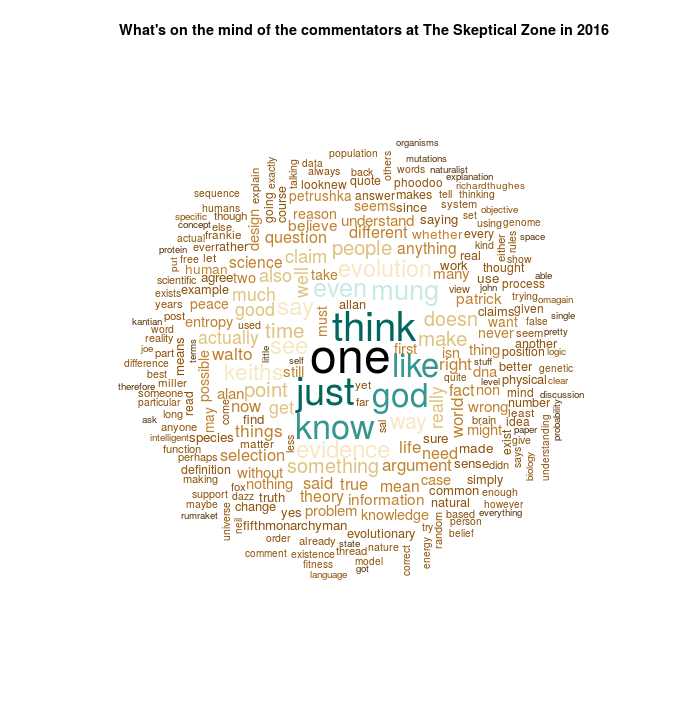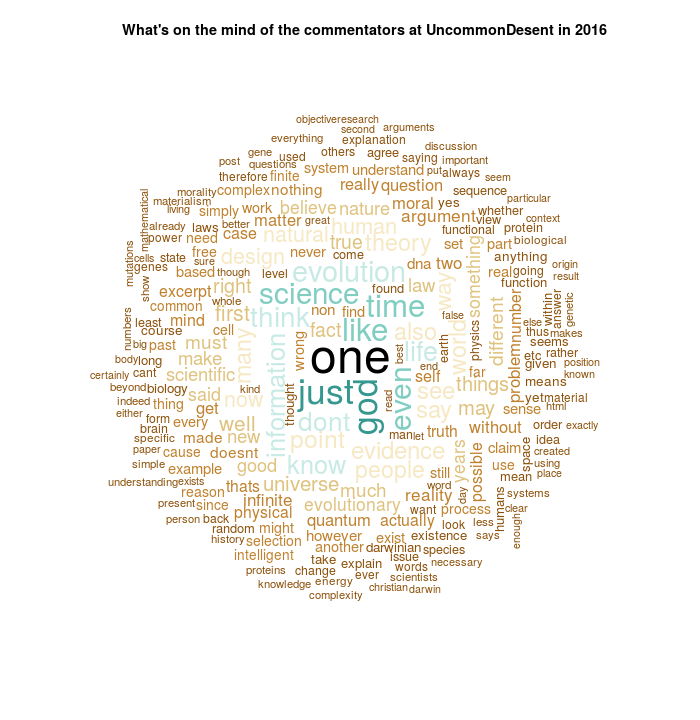(For last year’s results, see “Uncommon Descent” and “The Skeptical Zone” in 2015)
 |
| Fig 1 |
In 2016, “The Skeptical Zone” (TSZ) overtook “Uncommon Descent” (UD) – at least with regard to the number of comments:
Number of Comments 2005 – 2016
| year | 2011 | 2012 | 2013 | 2014 | 2015 | 2016 |
|---|---|---|---|---|---|---|
| UD | 41,400 | 28,400 | 42,500 | 53,700 | 53,100 | 28,000 |
| TSZ | 2,200 | 15,100 | 16,900 | 20,400 | 45,200 | 54,200 |
That is not much of a surprise: the general amnesty of Oct 2014 enlivened UD only for a short time. This trend seems to be spotted at UD, as user Dionisio started to proof the superior quality of edits at UD (I wonder why (s)he didn’t look for “oil of the red herring”…)
Number of Comments
 |
 |
| Fig 2 | Fig 3 |
| UD has three times at many contributors as TSZ – the need for socks could play a role…. | |
 |
 |
| Fig 4 | Fig 5 |
Number of Threads
 |
 |
| Fig 6 | Fig 7 |
The situation is reversed with the posts: only a few authors are allowed to start a thread at UD, while the group of authors at TSZ is more diverse.
 |
 |
| Fig 8 | Fig 9 |
Obviously, threads at TSZ gather more comments over time and can be go on for quite a while – while the longest living thread of UD is reanimated regularly by Dionisio….
 |
 |
| Fig 10 | Fig 11 |
Replies at “The Skeptical Zone”
Commentators at TSZ can (but don’t have to) reply to other comments – this allows to track the interaction between editors:
 |
 |
| Fig 12 | Fig 13 |
So, half of all comments were replies! The commentators who gave at least 50 replies are shown in the following graph:
the interaction between editors:
 |
| Fig 14 |
Top 100 Articles
 |
 |
| Fig 15 | Fig 16 |
 |
 |
| Fig 17 | Fig 18 |
Unique Editors per Month
 |
 |
| Fig 19 | Fig 20 |
- The number of unique editors per month is between 1.5 and eight times bigger at UD than at TSZ
- I had expected a more poignant effect of the amnesty, but it seems that the return of just a few previously banned editors was enough to create a flurry of activity for a couple of months.
Top 250 words used in comments in 2016
 |
 |
| Fig 21 | Fig 22 |
One Just God is at the heart of both blogs…
(added Jan 18,2016)
Ann: I gathered TSZ’s data by visiting http://theskepticalzone.com/wp/wp-admin/edit.php?post_type=post&all and http://theskepticalzone.com/wp/wp-admin/edit-comments.php – the numbers of threads and comments I got fit nicely the number of all published threads and all approved comments.
For UD, I enumerated the posts using the monthly archives, e.g., http://www.uncommondescent.com/2017/01/ , and then visited each post to collect the comments. This seems to agree with UD’s internal numbering of the comments: E.g., for 2016, I could retrieve 27,987 comments, while the numbering suggests that 28,729 comments were made: A rate of 2.6% of deleted and indefinitely moderated comments seems plausible…
UD’s post Uncommon Descent at 15000 posts: A tribute to Bill Dembski is my 14,999th post (out of ca. 17,700): that is as satisfying confirmation of my method, too.
Alas, I cannot give any guarantee that some edits and posts were not inadvertently omitted, and I’m grateful for any party involved willing to check my results.

Ouch:
“…Just because you allow a bunch of morons, like Robert Byers, Mung, V.Torley and others not to mention a pen of naturalists who seem to ignore the chasms in the foundation of their faith, to publish nonsense, it doesn’t mean that you are being successful.
Maybe you are successful in spreading s..t and misinformation…”
I don’t deny being a moron.
PopoHummel,
Originally, I was quite brutally parsing the articles and comments using regex in perl. Now, I’m doing the parsing via XPATH in R, which gives me the following numbers:
2011 | 2012 | 2013 | 2014 | 2015 | 2016
41993 | 28883 | 41946 | 53735 | 53130 | 28014
The only discrepancy with the number of comments as stated by Uncommon Descent at each article appeared in Following up Bostrom’s argument from simulation of universes . . . (for obvious reasons), but this is just an excess of two comments.
The difference to my earlier approach is below 1‰ for 2016 and below 3‰ for the years 2011-2015.
However, I have missed ca. 30 articles from Sep/Oct 2013 – which don’t change the result much, neither. I’ll try to retrieve them during the weekend.
I don’t know why our numbers differ that much, at the moment I’m quite confident that I got the numbers right with less than 1% deviation from Uncommon Descent’s own database – that is, for all still visible threads and comments.
Like you I also crawled, downloaded, and compiled all articles and comments into a well structered archive which can be analyzed. However I’ve encountered some problems along the way.
Here’s the workflow I’ve used to create the archive:
(1) Crawl the monthly archives, create an index with ALL article-links, and persist it. Each index entry contains the link and some metadata (date, author, number of comments, …).
(2) Iterate over each index entry and for each index entry
(2.1) Download the article
(2.2) Parse the article into a DOM
(2.3) Validate the DOM. Validation here means asserting that all elements (date, author, comments, …) are as expected.
(2.4) Extract all the data needed for the anlaysis and convert the article into a trimmed down version.
(2.5) Persist the trimmmed down version.
Here are some of the problems I’ve encountered:
For step (2) I’ve tried to iterate over the index entries using a thread pool with 20 threads (one thread for each iteration step). Unfortunately after a while I got connection errors. Using a thread pool with 5 threads solved the problem. I suspect the UD server or some node in the network didn’t like me bombarding it constantly with connections.
Sometimes step (2.3) failed for a downloaded article (authors couldn’t be found, html-tags were in the wrong position, etc.). Meaning if I were to use the downloaded article despite the validation errors, I would have gotten a wrong result. Downloading the article again usually solved the problem. I don’t know what went wrong. It seems like the UD server occasionally sent corrupt pages. Or maybe my HTTP-client somehow corrupted the data… ???
Sometimes I’ve had problems determining the author of a comment. I’ve found out there are three distinct possibilities how an author of a comment can be encoded in the article (e.g. see “data-cfhash”).
In the end I too noticed that the number of comments counted via acutally visiting the article does not reflect the number of comments extracted from the index entries alone.
PopoHummel,
What a timing!
1) dito
2) dito
2.1) dito
2.2) earlier just regexing the info (missing ca. 600 comments), now dito
2.4) dito
2.3) I just checked whether the number of retrieved authors etc. coincides with the number of comments as stated in the article
2.4) putting everything in a dataframe
And, since my New Years resolution was to be more supportive of those I disagree with, I will attest to the fact that Mung is a moron.
I finally feel like I really belong here. Thank you.
Mung,
Something about vessels taking on water and rodents 😉
Just an update on the Dionisio saga on the “Mystery at the heart…” thread.
He/she is now up to 107 unanswered comments for this year. He is on track to exceed 2,600 comments on a single three year old thread in 2017.
I added two figures on the number of unique editors per month to the article:
Interesting. Is it possible to repeat that excluding News? She produces the greatest number of articles but very few of them draw much discussion. Her role, as far as I can tell, is as a news aggregator as opposed to creating opinion pieces.
Acartia,
As Denyse doesn’t attract a swarm of editors who would solely contribute to the threads which she started, she hasn’t much influence on the graph of “Unique Visitors per Month”.
What percentage of posts authored by Mung were sent to Guano in 2016?
I’d like to see whether I should consider myself to be a martyr.
Any way to tell how many posts were Guanoed by each moderator?
As far as I know, you have the ability to count.
I don’t think so.
Note that you should have asked that in the moderation thread, not here.
Only you can decide how you should consider yourself. I’m pretty sure that there are others who are guanoed at a higher rate.
I’m with KN. If one of my posts is in Guano it probably belongs there.
I’m just wondering why keiths thinks that I think that makes me a martyr.
Sorry, I cannot tell whether a comment was moved.
If i remember this J-Mac is a malicious commentator who never had sharp thinking things to say.
So calling people morons leaves no sting.
if a accuser thinks folks are morons then itemize or their top three.!!
this person doesn’t give their real name as if these subjects demand staying the shadows of the internet.
I give my real name and happy, or prod(if thats the word) of all i say morally or intellectually.
People on these origin forums are always those who have applied thier minds more then the average to sciencey things. Those who are regulars.
If a forum on on these subjects banns people then its breaking the freedom right of a people to engage in these subjects unless malice is involved.
I can say, fopr most, those banned from uD are not malicious but many , like this j-mac , who are malicious still remain.
Therefore the agenda is a control on conversation and not a freedom of enquiry, speech, and roughing around the net(Canadian term).
it really is the bad guys who segregate away folks from subjects that belong to all.
yeah thats the movie here.
Everybody could do a better job, some more needful, and make origin contentions come to a successful conclusion for those who are right.
Then the world will follow, as usual, steps behind.
the wordle for the top 250 words in all comments at UD in 2016…
… and the same for TSZ in 2016
Is there a point to this thread?
Fancy using some sentiment dictionaries?
Unsurprisingly, “think” is more prominent at TSZ than at UD.
So is guano.
And so is Mung.
If there was, you wouldn’t understand it.
keiths:
Acartia:
Hence my frequent admonition:
One of these days he’ll actually do it.
I often think how much better this site would be without you. 🙂
Text Summarization?
There seem to be good both R and Python packages:
Thanks, that’s a very interesting subject….
Time for defeaturization, isn’t it? Thanks again for making this a sticky topic!
That is because we have to keep reminding evolutionists to do so. Yet they don’t seem to be capable of it
DiEb,
Yes, I think it’s time. Thanks very much for all the work and time you put in, DiEb.
http://www.alexa.com/siteinfo/uncommondescent.com
And, despite my best efforts:
http://www.alexa.com/siteinfo/theskepticalzone.com
Well, at least now we know that UD is popular in the United States and Egypt.